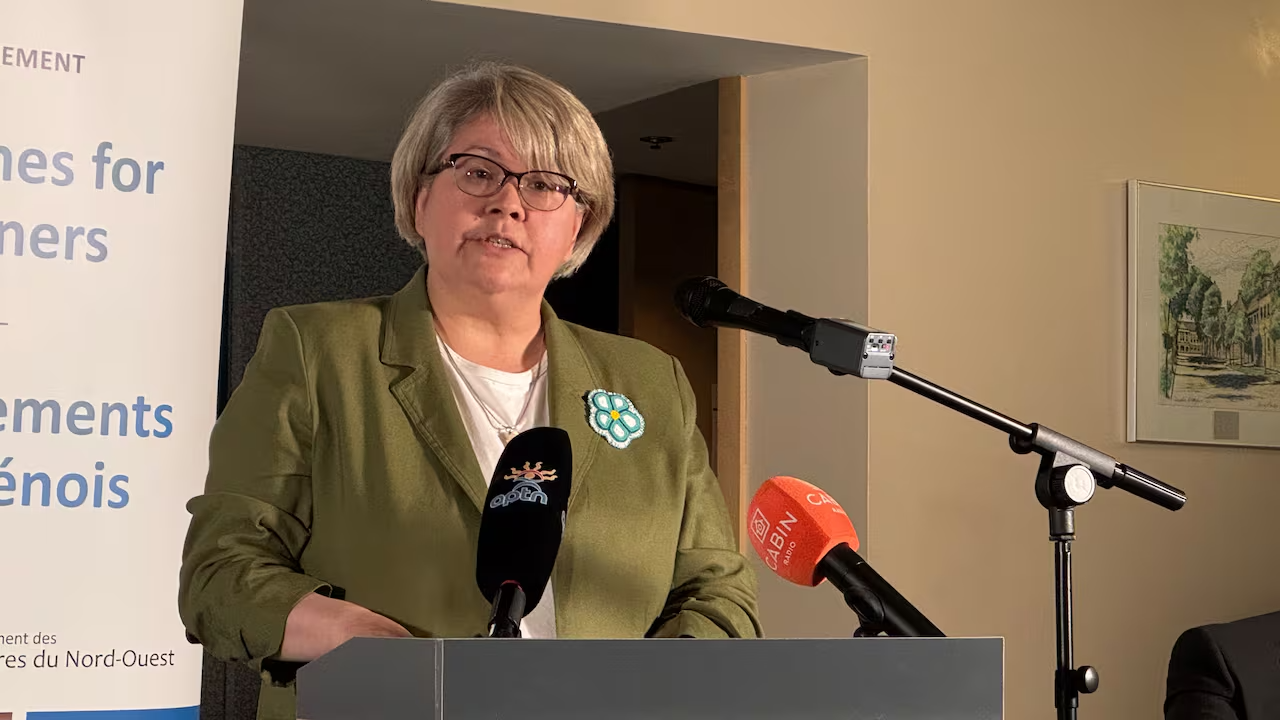Q&A | N.W.T. housing minister not sure gov’t should be ones to provide public housing

Minister said she’s not surprised by scathing report from Auditor General
The Northwest Territories’ housing minister said her department is discussing the possibility of non-government organizations (NGOs) or Indigenous governments taking over public housing in communities in the N.W.T.
A report from the Office of the Auditor General of Canada released Tuesday said the territory had poorly managed the condition of public housing in the territory. It found that Housing N.W.T. was inconsistent in applying its own policies, including in how it allocated homes and whether local housing organizations in communities were applying its point system.
The audit also found the agency did not effectively manage the condition of public housing units. Housing Minister Lucy Kuptana said there are 45,000 outstanding work orders for repairs in public housing units across the territory.
Many of the issues raised in this week’s report have been highlighted in previous auditor general reports in 2008 and 2012.
Housing N.W.T. has accepted all of the Office of the Auditor General’s recommendations for improvement. Housing Minister Lucy Kuptana spoke with Shannon Scott, host of CBC’s Trailbreaker, about her reaction to the report and her department’s next steps.
This interview has been edited for length and clarity.
How surprised were you by the findings in this audit?
I wasn’t surprised at all.
If you knew that these were issues, why weren’t they being dealt with already?
I know the work is already being dealt with. This is a past performance review.
Coming in as minister, getting the many briefings and the updates, understanding the situation with housing. I think the most important thing that I did is actually going into people’s homes and looking at the conditions to understand where they’re coming from. Seeing is believing so that’s why I say I wasn’t surprised.
So you knew that these issues existed, what was being done before this audit to change it?
Housing is limited in funding. I pushed very hard to get additional funding for housing in the Northwest Territories. So that happened in the main estimates for early 2025.
I feel like money isn’t really the main point of this audit. Housing N.W.T., it was found, was not making sure units were allocated based on need. Even though there was a criteria that units were allocated that way no one checking their own criteria applied. Why wasn’t that being done?
I know Housing N.W.T. has come up with a number of reasons why it wasn’t done in a timely fashion for the auditor general response and I think what we need to do is to make sure that we do those quarterly reviews, that we talk to local housing organizations (LHO).
The district offices have to make sure that the work is being done and headquarters have to be the one to ask districts ‘ok where are those quarterly updates? Where are those quarterly reviews? Provide a report on what are we doing with this community in terms of the number of work orders they have in place,’ so these things take constant communication and collaboration to make sure things are being done.
We had assistant auditor general Paule-Anny Pierre on our show talking about the implications of all of this for the people who rely on housing from your department and she said with the systemic issues she’s seeing, it could push people toward homelessness.
How do you react to that, that your department that’s supposed to be helping people be housed could be pushing them towards homelessness through mismanagement?
I think that we have to be proactive about this and learn from this lesson, how we support people in community to remain within their home. I think we’ve done a lot of work from our strategic renewal process since 2021 and a lot of it is built around how we help tenants and tenant rights and conditions.
Things like the ability to have a reassessment, the ability to look at a compromise agreement, the ability for a last chance agreement before evictions.
Looking at having a third party assess the unit condition ratings to make sure that we’re having the proper data in place. So when we do go to the federal government and have these conversations, we have the proper data in place.
Let’s move on to maintenance. The report found that Housing N.W.T. is not effectively managing the conditions of units or checking about repairs. Do we know why?
I think capacity is one thing. In some communities, we’re dealing with many units that are over 50 years old and systems are failing.
We have one community alone with over 1,000 work orders in place and it’s hard to catch up to the work order system once you’re behind. We need capacity within community. We need people working for the local housing organization.
And I think a lot of it is just providing the supports and making sure that we’re collaborating, we’re communicating, that quarterly reports are done on time, that there are visits into community to see housing conditions for themselves. Again, I think it’s just working in partnership with our local housing organizations.
What do you say to people who are living in substandard conditions right now?
First of all, I want to apologize that they’re living in substandard conditions and this is not acceptable. People need to have a good home to raise their family and to live within community because we need everybody all together. And I think Housing N.W.T. has a big job to do and we have to be accountable and we have to be providing that report.
I think as local housing organizations too, if they need that support as well, they reach out to the district, but the district also reaches out to them. So it’s a two-way street.
Many of these issues have come up in two past audits with little changed since then. Why haven’t we seen more movement on these issues? Why can’t the government seem to effectively monitor its own programs?
One thing that we’re learning is, is government the one to be doing this? We need to ask ourselves that.
Is the government of the Northwest Territories the one to provide social housing in community? We are having discussions with Indigenous governments and NGOs that are interested in taking over some of the housing operations within community.
Looking at Indigenous governments or a potential NGO to take this over so it’s not government doing providing housing at the local level. So we’re looking at options to provide better housing conditions.
I’m curious about the recommendations from this report. Your department has accepted all of them. What are you going to be tackling first?
The home ownership piece, I talked about having discussions with Indigenous governments and NGOs to see if they could, [and] are they interested in taking that on and managing it on behalf of Housing N.W.T.?
Looking at the unit condition ratings, perhaps we need a third party assessor to do that work because how do we know what needs to be done if it’s not properly assessed?
And then we have to look at all the work orders that need to be done immediately and get those done. So we need a plan in place to fix up homes.
What kind of assurances can you give people that this time we are actually going to see change and improvement?
I think we have the team in place and the leadership in place to ensure that things get done. And I think the work of the N.W.T. Housing forum is really instrumental to progressive work across the territory. And our federal engagement piece too. The federal government is interested in building homes across Canada. We want to be a big part of that.
I think data too. I think we have over 45,000 work orders across the Northwest Territories and with local housing organizations. So let’s get that number down, let’s improve conditions, let’s upgrade peoples’ homes.
I talked about quarterly reports, making sure that those reports are being done and submitted on time.
I just did some quick back-of-the-napkin math here. In the roughly two years of your government, if we wanted to clear that out by the time you’re done, that’s 1,875 work orders completed a month. Is that possible?
I don’t know if that’s possible. We’ll try to do our best with what we have.
Related stories from around the North:
Canada: Auditor general gives Housing N.W.T. a bad grade, again, CBC News
Greenland: Despite housing shortages, Greenland razes colonial apartment blocks, Blog by Mia Bennett



